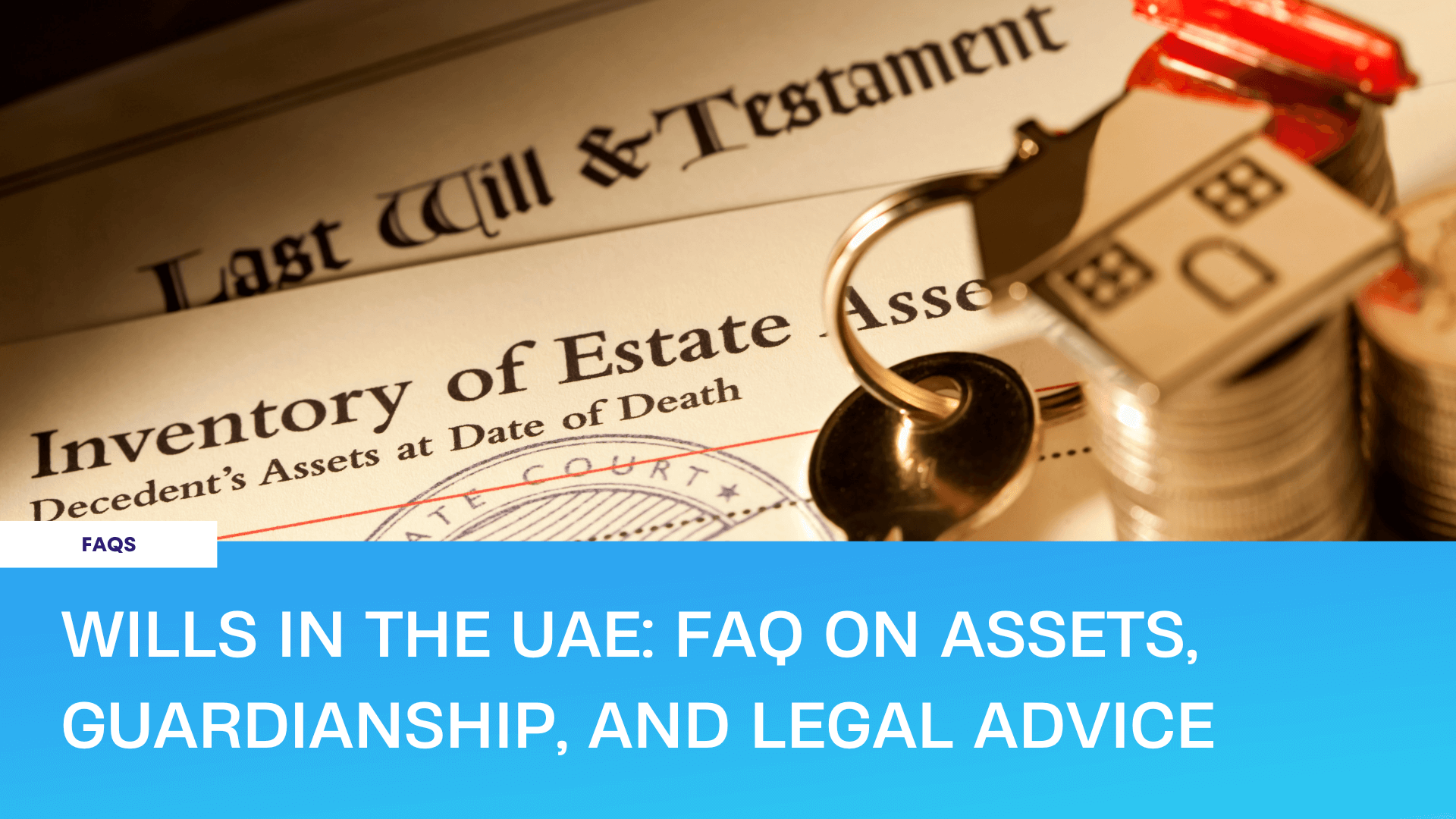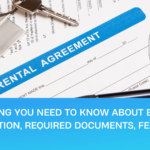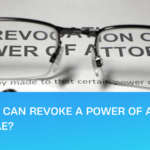Wills in the UAE: FAQ on Assets, Guardianship, and Legal Advice

Planning your estate is key to protecting your assets. Wills in the UAE provide a legal framework for distributing property, appointing guardians, and managing personal matters. This FAQ answers common questions about registration, probate, assets, and guardianship.
Quick Summary – Wills in the UAE
- Protect your assets: Ensure your property and financial holdings are distributed
- Muslims vs Non-Muslims: Sharia applies to Muslims; non-Muslims follow UAE civil law.
- Registration: Online via DIFC, Dubai Courts, or ADJD
__
General FAQS about Wills in the UAE
____________________________
What is a Will?
A will, also known as a testament, is a legal document that outlines how a person’s assets and property should be distributed after their death.
Can I register a Will online in the UAE?
Yes, you can register a Will online in the UAE.
Can I register a Will if I am a non-UAE resident?
Yes, non-UAE residents are also eligible to register a Will in the UAE.
Can Muslims register Wills?
Muslim individuals are allowed to register a Will at the Personal Status Court; however, such Wills must fully comply with Sharia principles.
Are foreign Wills enforceable in the UAE?
No. Foreign Wills may not cover UAE assets properly. Registering a UAE-specific Will ensures local enforceability.
Is bilingual drafting in both Arabic and English necessary?
Yes, official documents often require parallel versions, with Arabic taking legal precedence. However, the DIFC Wills are drafted only in English.
Does the UAE accept a Will drafted in my home country, including assets in the UAE, if I legalise and translate this document into Arabic?
Yes and No. Wills drafted abroad may be accepted only if they were drafted in accordance with UAE laws. Foreign Wills are generally not accepted in the UAE if they are not in compliance with UAE laws, even if legalized and translated. It is essential to draft a Will locally to ensure legal validity.
Is a video-verification (Zoom or Teams) required?
Yes, a video session with the Testator is mandatory.
Who should participate in the online Will registration hearing?
In DIFC Wills, only the testator and two witnesses participate in the online hearing. In other UAE courts (such as ADJD or Dubai Courts), only the testator is required to participate.
Does my spouse need a Will as well?
If you have children or if your spouse has any assets in the UAE, then your spouse should also have a Will. We can draft Mirror Wills for couples and have jointly owned assets.
What is a Mirror Will?
Mirror Wills are two separate Wills for married couples that will be almost identical or very similar.
What is the difference between a Single Will and Mirror Wills?
A Single Will is a will created by one individual, outlining their wishes for their estate upon their death. Mirror Wills, on the other hand, are two separate wills, typically created by a couple, that are designed to be very similar, often mirroring each other’s wishes regarding asset distribution and beneficiaries.
Can I make an amendment after registering a Will?
No. You should revoke and register a new Will. But only the DIFC allows amendments to a registered Will.
What legal mistakes to avoid in UAE Wills?
A will is an important legal document and is usually done once in a lifetime. Therefore, avoid the use of generic online templates, unclear clauses, inconsistent bilingual drafting, unregistered documents, and weak executor/guardian selection.
Should I opt out of Sharia succession rules in my Will?
Non‑Muslims must include a clear opt‑out clause to avoid default Islamic inheritance laws.
Which Will type is better for my assets—DIFC or ADJD?
DIFC Will – broader coverage, English only, English-language video hearing. ADJD Will – UAE assets, Arabic + English, does not require witnesses; however, several restrictions for non-UAE residents.
What happens if I die without a Will (intestate)?
Estate distribution shall be based on laws, and the court may decide to apply Sharia succession principles, which may conflict with your intentions.
What is probate?
Probate is the legal process through which the court approves how your assets are distributed following your death. If you have a Will in place, the court should interpret the Will and distribute your assets in accordance with your wishes.
Are my bank accounts automatically frozen when I die?
Yes. All bank accounts in the UAE are frozen on your death (including any joint bank accounts). Your bank accounts will be frozen until the court has provided an order in relation to the distribution of your assets.
How to legally dispose of a body or burial wishes?
Include specific post-mortem directions in the Will.
____________________________
General FAQ about Assets
____________________________
This section answers common questions about assets in a UAE Will, including current and future property, complex holdings like joint accounts or trusts, and choosing executors and beneficiaries.
Can I register a Will if my property is still under construction?
Yes, we can proceed with a General Will, where we mention any current or future property, including those still under construction.
Can I add my future assets to a Will while registering?
Yes, we can draft a General Will that includes “all movable and immovable assets in the UAE”, which covers both existing and future assets.
How do I include complex assets like joint bank accounts or trusts?
For joint property or bank accounts, consider Mirror Wills for spouses; for trusts, appoint a trustee to manage funds until conditions are met.
Who is an Executor?
An executor is a person named in a Will who is aware of its existence and is responsible for ensuring the testator’s wishes are carried out after their death. Executors handle the administration of the estate, including settling debts and distributing assets to the beneficiaries.
What if my executor lives outside the UAE?
You can still appoint him as an executor. But we recommend choosing executors based in the UAE, or name alternates to avoid delays.
Who is a beneficiary?
A beneficiary is someone who was chosen by the Testator to inherit their property as laid out in the Will.
Who is an heir?
An heir is set to inherit the property of the deceased when no will has been made.
Can I name non-family beneficiaries (e.g., charities)?
Yes, non-Muslim Wills may include third-party or charitable donations.
Do pets count as beneficiaries?
No, animals cannot inherit under UAE law.
Can non-Muslim expats choose their beneficiaries freely under UAE law?
Yes, non-Muslims are free to appoint any beneficiary, not limited to blood relatives.
👉 Read More About UAE Wills for Expats
_______________________________
General FAQ about Guardianship
_______________________________
This section covers guardianship, including how to appoint executors and guardians for minors, and naming alternates to ensure smooth estate administration.
Can I appoint a minor as a guardian or executor in a UAE Will?
No, a guardian or executor must be at least 21 years old.
Can I appoint a male guardian for my daughter?
No, you should follow gender/residence rules. Female minors need female guardians or married couples.
Can I appoint my minor children as beneficiaries?
Yes, however, you should appoint a guardian/s
Can minor children directly inherit, or is a guardian needed?
Minors inherit under a guardian’s management until the specified 21-year-old
How do I appoint alternate executors and guardians?
Always name 2–3 alternates, ideally UAE-based, to step in if primary appointees become incapacitated or unavailable, ensuring smooth estate administration.
Disclaimer: The content on this page is for general information purposes only and does not constitute as legal advice nor should it be used as a basis for any specific action or decision. Nothing on this page or website is to be considered as rendering of legal advice or legal services for any specific matter. Users of this website are advised to seek specific legal advice by contacting a lawyer regarding any specific legal issues.





